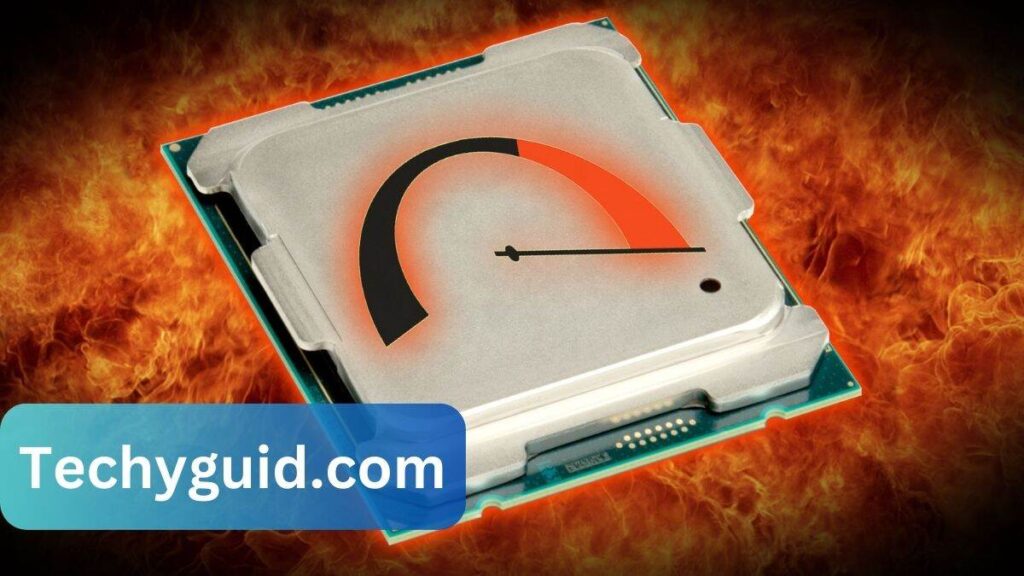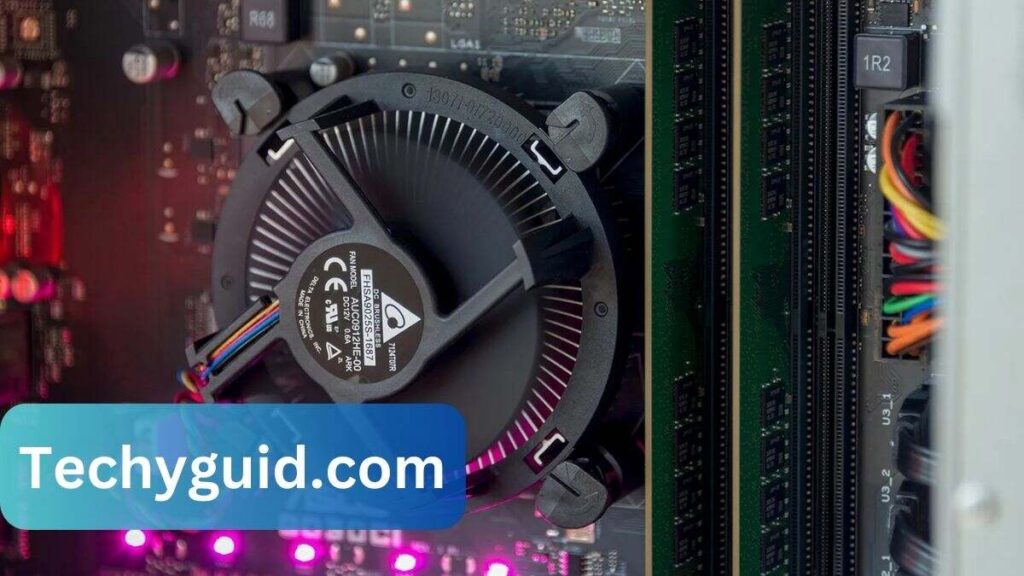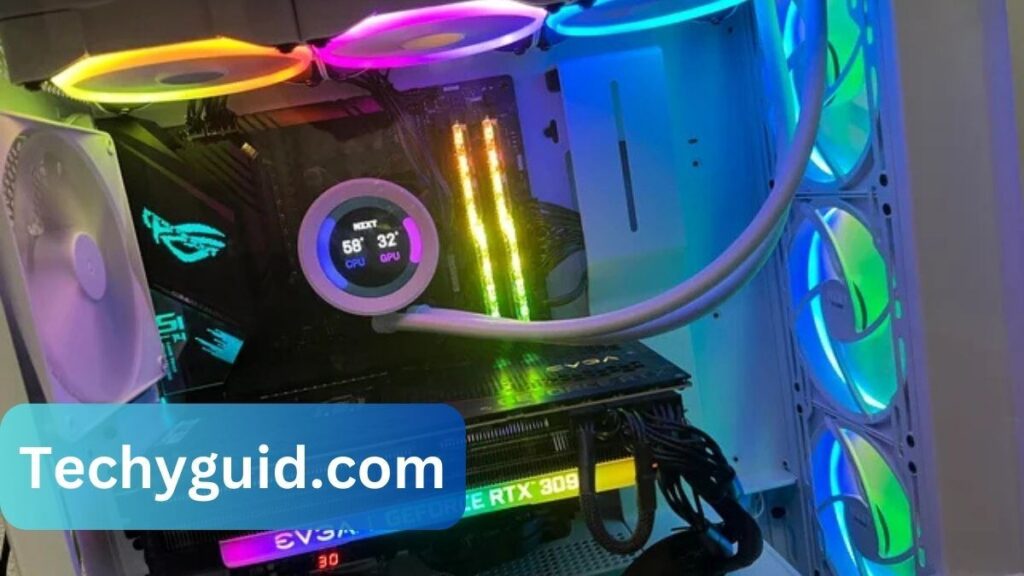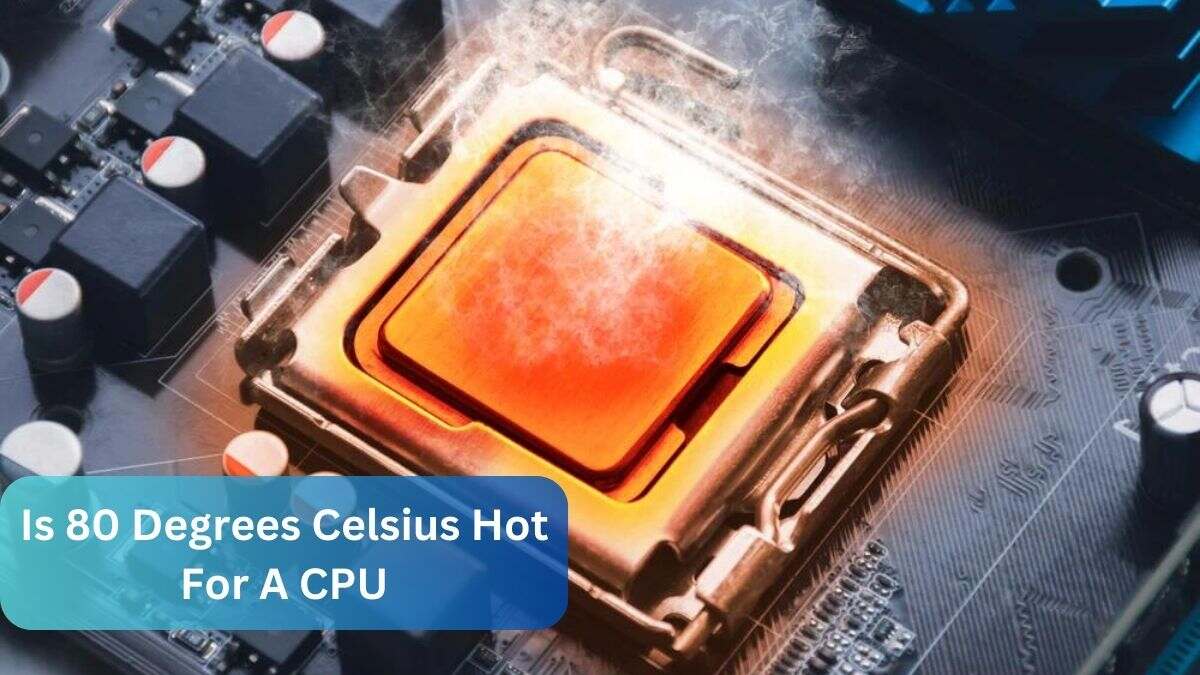80 degrees Celsius is not dangerously hot, but it’s close to the upper safe limit for most CPUs under load. While modern CPUs can handle this temperature, running at 80°C for long periods may reduce their lifespan. Ideally, aim to keep your CPU under 75°C for better performance and longevity. If it consistently hits 80°C, consider improving your cooling setup.
In my experience, when my CPU was running at 80 degrees Celsius during gaming, I noticed slight performance drops. Upgrading my cooling system helped bring the temperature down and improved overall stability.
In this article, we will discuss “Is 80 Degrees Celsius Hot For A CPU”.
Table of Contents
Introduction
The CPU, or central processing unit, is the heart of your computer. Just like your car’s engine, it generates heat while working. Managing CPU temperature is critical to ensure optimal performance, avoid hardware damage, and maintain the longevity of your system. But here’s the big question: is 80 degrees Celsius hot for a CPU? Let’s dive into the details.
Understanding CPU Temperatures
What is a Normal CPU Temperature Range?
For most modern CPUs, a normal temperature at idle sits between 30–50°C. Under load, like while gaming or rendering videos, temperatures between 60–75°C are typical.

Factors Influencing CPU Temperature
Several factors can influence your CPU’s temperature, including:
- Ambient room temperature
- The efficiency of your cooling system
- The type of workload your CPU is handling
The Threshold of “Hot”
What is Considered “Hot” for a CPU?
The definition of “hot” varies by manufacturer, but most CPUs are designed to operate safely up to 90–100°C. However, prolonged exposure to temperatures near these thresholds isn’t recommended.
Safe vs. Unsafe Temperature Ranges
- Safe Range: Below 80°C under load
- Moderate Risk: 80–90°C (requires attention)
- Unsafe: Above 90°C (can lead to thermal throttling and damage)
Read Most Important: Amd cpu vasp av520 – Full Ultimate Guide 2025!
Idle vs. Load Temperatures
A CPU’s temperature will naturally vary depending on its workload. At idle, your CPU should ideally remain under 50°C. During heavy tasks like gaming or video editing, temperatures can climb to 70–80°C. However, consistently hitting 80°C under normal load can be a warning sign.
Is 80 Degrees Celsius Safe?
Explanation of Thermal Limits
While most CPUs can technically handle 80°C without immediate issues, it’s close to the upper limit of what’s considered safe for prolonged use.
Manufacturer-Specific Guidelines
Intel and AMD both specify maximum operating temperatures (Junction). For example:
- Intel Core i9-13900K: 100°C max
- AMD Ryzen 9 7950X: 95°C max
At 80°C, you’re still below the danger zone, but it’s worth checking your cooling setup.
Longevity Concerns at High Temperatures
Running a CPU near 80°C consistently could reduce its lifespan, as heat accelerates wear and tear on internal components.
Impacts of High CPU Temperatures
Reduced Performance (Thermal Throttling)
When temperatures rise too high, CPUs automatically slow down to prevent overheating, leading to lower performance.

Potential Hardware Damage
Excessive heat can damage not only the CPU but also other components, including the motherboard and RAM.
Increased Energy Consumption
Higher temperatures often result in higher power draw, reducing energy efficiency.
Causes of High CPU Temperatures
Overclocking and Performance Tuning
Pushing your CPU beyond its default clock speeds increases heat output. Overclocking requires a robust cooling solution to prevent overheating.
Poor Cooling Solutions
Air coolers might struggle with high-end CPUs, while liquid coolers can handle heavier loads more effectively.
Dust and Debris
Dust buildup on fans and heat sinks reduces cooling efficiency, causing temperatures to rise.
Read Most Important: Should You Cover CPU All The Way – Ultimate Guide 2024!
Inadequate Case Ventilation
Poor airflow inside your case traps heat, making it difficult for your CPU to stay cool.
How to Monitor CPU Temperatures
Monitoring your CPU’s temperature is easy with tools like HW Monitor, Core Temp, or NZXT CAM. These tools provide real-time data and alerts if your CPU exceeds safe thresholds.
Ways to Lower CPU Temperatures
Upgrade Your Cooling System
Consider investing in a high-performance air cooler or an AIO liquid cooler.
Clean Your PC Regularly
Remove dust from fans, vents, and heat sinks to maintain efficient airflow.
Apply Thermal Paste
Reapply thermal paste every couple of years to ensure optimal heat transfer between the CPU and cooler.
Optimize Case Airflow
Arrange fans for efficient airflow—intake at the front, exhaust at the back and top.
Preventing Overheating in the Future
- Clean your PC every 3–6 months.
- Choose components with good thermal performance.
- Avoid overclocking unless you have an advanced cooling system.
When to Worry About CPU Temperatures
If your CPU consistently runs above 80°C, it’s time to investigate. Symptoms like sudden shutdowns, sluggish performance, or system crashes can indicate overheating.
Common Myths About CPU Temperatures
- Myth 1: CPUs can handle any temperature. (Not true; every CPU has a thermal limit.)
- Myth 2: Liquid cooling is always necessary. (Not for most users, unless you overclock.)
Part 1: What Is Good CPU Temperature
What is a Good and Normal CPU Temp?
A good and normal CPU temperature ranges between 30–50°C when idle and 60–75°C under load.

Average CPU Temp
For most tasks, the average CPU temperature is 40–65°C, depending on the workload and cooling system.
Safe CPU Temp
Safe CPU temperatures are below 80°C under load, ensuring performance and component longevity.
How Hot is Too Hot for a CPU?
Above 90°C is considered too hot and could lead to thermal throttling or hardware damage.
Good CPU Temp While Gaming/Streaming
During gaming or streaming, a good CPU temperature is around 60–75°C, though some high-performance CPUs may handle up to 80°C.
In A Nutshell
Keep your CPU below 80°C under load and aim for 30–50°C at idle for optimal performance and durability.
Part 2: How to Check CPU Temperature
Method 1: Check CPU Temperature with BIOS
Access your BIOS or UEFI by restarting your PC and pressing the appropriate key (like F2 or DEL). The CPU temperature is displayed under the hardware monitor or system information section.
Read Most Important: AdoptOpenJDK 11.24.8 Pegging CPU Due to PrintStream – Ultimate Guide 2025!
Method 2: Use CPU Temperature Monitoring Software
Install software like HWMonitor, Core Temp, or NZXT CAM to monitor real-time CPU temperatures easily.
Method 3: Check CPU Temperature with an Infrared Thermometer
Point an infrared thermometer at the CPU’s heat spreader or cooler for an instant temperature reading.
Tip: How to choose an IR thermometer
Choose one with a small measurement spot, a fast response time, and a suitable temperature range for electronics.
Check CPU temperature with a handheld IR Thermometer
Aim the handheld thermometer at the center of the CPU cooler for an accurate reading.
Check CPU temperature with an IR Imaging Gun
Use an IR imaging gun to get a thermal image of your system, identifying hotspots around the CPU.
Part 3: Why Is My CPU Too Hot?
Your CPU could be overheating due to poor cooling, dust buildup, high ambient temperatures, or overclocking without adequate cooling solutions.
Part 4: How to Cool the CPU Down
Method 1: Boost the Cooling System
Upgrade your air cooler or switch to a liquid cooling system for better heat dissipation.
Method 2: Keep the Room Cool
Use air conditioning or ensure proper ventilation in your room to lower the ambient temperature.
Method 3: Avoid Starting Unbearable Missions
Close resource-heavy applications or reduce CPU load to prevent overheating during intense tasks.
Method 4: Upgrade the CPU
If your CPU frequently overheats despite good cooling, consider upgrading to a newer, more efficient model.
Is 80 degrees Celsius hot for a GPU?
80°C is not excessively hot for a GPU, as many GPUs are designed to handle up to 85°C–90°C under heavy load. However, consistently running at this temperature may shorten the GPU’s lifespan. It’s recommended to keep GPU temperatures below 75°C for long-term stability and performance. Improving airflow and cleaning the fans can help manage this.
Is 80 degrees Celsius hot for a CPU while gaming?
80°C while gaming is on the higher end of the safe range for a CPU. While most CPUs can tolerate temperatures up to 90°C, prolonged gaming at 80°C can increase wear and tear. To lower the temperature, ensure good cooling, apply high-quality thermal paste, and clean the dust off the fans and heat sinks.
Is 80 degrees Celsius hot for a CPU Reddit?
Reddit users often consider 80°C to be the maximum safe temperature under load. Many agree that while it’s acceptable for short periods, sustained temperatures at 80°C can lead to thermal throttling. Gaming, rendering, or other intensive tasks should ideally keep the CPU below 75°C for long-term reliability.
Is 90 degrees Celsius hot for a CPU?
Yes, 90°C is too hot for most CPUs and indicates potential overheating. At this temperature, the CPU may throttle performance to cool down, and sustained use at 90°C can damage the processor over time. Check for issues like inadequate cooling, poor thermal paste application, or high ambient temperatures.
Why is my CPU at 80 degrees idle?
If your CPU reaches 80°C at idle, there’s likely an issue with your cooling system. Common causes include a failing CPU cooler, dust buildup in fans, dried-out thermal paste, or background processes consuming high CPU usage. Inspect your hardware and software to identify and resolve the problem.
Is 70 degrees Celsius hot for a CPU?
No, 70°C is generally considered safe for most CPUs under load. However, it’s slightly high for an idle CPU. If your CPU consistently stays at 70°C during normal tasks, it’s worth checking your cooling setup and airflow.
Is 80 degrees Celsius hot for a CPU gaming laptop?
For gaming laptops, 80°C is common due to their compact design and limited cooling systems. While it’s not dangerously high, sustained temperatures at 80°C can impact the lifespan of the laptop. Use a cooling pad, keep vents clean, and avoid placing the laptop on soft surfaces to improve airflow.
Is 90 degrees Celsius hot for a CPU while gaming?
Yes, 90°C while gaming is too hot for a CPU and can lead to thermal throttling or hardware damage over time. This may indicate inadequate cooling, overclocking, or high ambient temperatures. To prevent overheating, improve cooling, reduce game settings, and ensure proper airflow in your case.
What is a good CPU temperature for gaming?
A good CPU temperature for gaming ranges between 60°C and 75°C under load. Staying within this range ensures optimal performance and prevents overheating issues.
CPU temperature whilst gaming
During gaming, CPU temperatures typically range from 60°C to 80°C, depending on the game and cooling setup. High-end CPUs might handle up to 85°C, but keeping it below 75°C is ideal.
What temperature is too hot for a CPU?

Temperatures above 90°C are considered too hot for most CPUs. At this point, thermal throttling may occur to prevent damage, and sustained heat can shorten the CPU’s lifespan.
How to lower CPU temperature
To lower CPU temperature, clean dust from fans and vents, improve case airflow, replace thermal paste, and consider upgrading your cooling system. Reducing CPU-intensive tasks can also help manage heat.
Read Most Important: Blender using cpu when ive told it not to – Guide 2024!
FAQs
What is the ideal temperature for gaming CPUs?
The ideal temperature for gaming CPUs is under 75°C during heavy load. Staying below this ensures optimal performance and longevity.
Can high CPU temperatures damage other components?
Yes, excessive heat can affect nearby components like the motherboard, GPU, and RAM, potentially reducing their lifespan.
How often should I clean my PC to avoid overheating?
Clean your PC every 3–6 months to remove dust from fans, vents, and heatsinks. Regular cleaning improves airflow and cooling.
Are laptop CPUs more prone to overheating than desktops?
Yes, laptops have limited cooling due to compact designs, making them more susceptible to overheating under heavy usage.
Does undervolting reduce CPU temperatures?
Yes, undervolting reduces power consumption, which lowers heat output while maintaining stable performance.
Conclusion
In conclusion, while 80°C is not dangerously hot for a CPU, it’s close to the upper limit, especially under gaming or heavy workloads. To ensure your CPU’s longevity and performance, aim to keep temperatures below 75°C and improve your cooling setup if temperatures rise consistently. Regular maintenance and proper cooling strategies can prevent overheating and protect your components.
Read Most Important:

[…] Read Important: Is 80 Degrees Celsius Hot For A CPU – Complete Guide 2024 […]
[…] Read Important: Is 80 Degrees Celsius Hot For A CPU – Complete Guide 2024 […]
[…] Read Most Important: Is 80 Degrees Celsius Hot For A CPU – Complete Guide 2024 […]